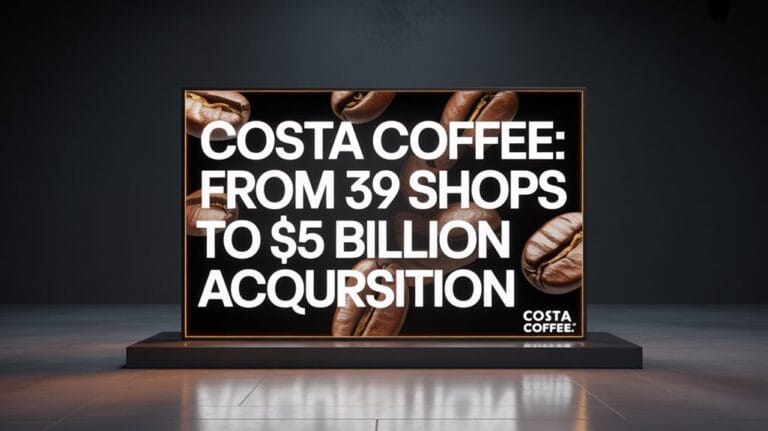Coca-Cola’s $5.1 billion gamble on coffee raised eyebrows when the beverage giant acquired Costa Coffee from British company Whitbread in January 2019. The massive deal was supposed to give Coca-Cola a strong foothold in the growing global coffee market, which expands by about 6% each year.
Coca-Cola’s massive $5.1 billion Costa Coffee acquisition aimed to capture the rapidly expanding global coffee market.
The acquisition brought significant assets to Coca-Cola’s portfolio. Costa came with nearly 4,000 retail outlets spread across more than 30 countries, coffee vending operations, and a state-of-the-art roastery. The London-founded coffee chain, established in 1971, had built a presence in Europe, Asia Pacific, Middle East, and Africa. In the current landscape, many consumers are gravitating towards third wave coffee which emphasizes artisanal quality and origin transparency.
However, market challenges have emerged since the deal closed. The coffee industry faces intense competition from established players and changing consumer habits. Coca-Cola’s growth strategies for Costa haven’t delivered the expected results, leading company executives to question whether the investment was worth it.
The original purchase aimed to diversify Coca-Cola beyond sugar-sweetened drinks. Company leaders wanted to utilize healthier beverage trends and expand their reach in coffee shops, vending machines, and ready-to-drink products. They believed combining Costa’s coffee expertise with Coca-Cola’s marketing power and global distribution would create a winning formula.
Whitbread’s decision to sell wasn’t entirely voluntary. Activist hedge funds, including Elliott Management, pressured the British company to break up and focus on core businesses like Premier Inn hotels. The deal, code-named ‘Project Del Sol,’ moved quickly because both companies saw strategic benefits.
The transaction required regulatory approval in the European Union and China before completion. By closing, the final price dropped slightly to $4.9 billion, though still representing a massive bet on coffee’s future. Costa had demonstrated remarkable growth under Whitbread’s ownership, transforming from just 39 shops into a leading international coffee brand over 23 years.
Coca-Cola planned to accelerate Costa’s expansion, particularly in Asia Pacific, Middle East, and Africa. The company wanted to capitalize on Costa’s existing footprint while introducing new formats and products. Costa’s vending system, Costa Express, offered unique opportunities for growth. The acquisition was expected to be slightly accretive in the first full year without purchase accounting impact.
Today, questions linger about whether Coca-Cola can turn its costly coffee investment into the growth engine it envisioned when signing the deal four years ago.





